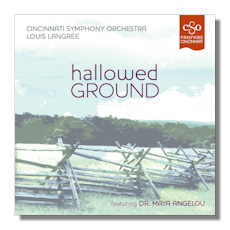
The Internet's Premier Classical Music Source
Related Links
-
Copland Reviews
Lang Reviews
Muhly Reviews - Latest Reviews
- More Reviews
-
By Composer
-
Collections
DVD & Blu-ray
Books
Concert Reviews
Articles/Interviews
Software
Audio
Search Amazon
Recommended Links
Site News
 CD Review
CD Review
Hallowed Ground

- Aaron Copland: A Lincoln Portrait *
- David Lang: mountain
- Nico Muhly: Pleasure Ground **
* Dr. Maya Angelou, speaker
** Nathan Wyatt, baritone
Cincinnati Symphony Orchestra/Louis Langrée
Fanfare Cincinnati FC-003
I mean no disrespect to Music Director Louis Langrée when I say that the highlight of this disc for me is the late Dr. Maya Angelou. A noted African-American activist and poet, she was featured in this performance of A Lincoln Portrait just months before her death. Though clearly not in the best health, the sheer humanity and emotion behind her delivery of Lincoln's timeless words elevates them to a higher level. There is conviction, and then there is this; a heartfelt, personal, and powerful expression of what has built the values of the United States. It's remarkable, and is easily the most moving performance of this work I have yet heard.
As for the Cincinnati Symphony Orchestra, they play extremely well. The brass section of this orchestra has always been underrated; this is an exceptional Mahler and Bruckner ensemble, after all. New Music Director Louis Langrée probably didn't make his career training in the American classics, but you wouldn't know that from this tremendously persuasive account of the Copland, which is dramatic and clearly influenced by the quietly forceful presence of Dr. Angelou. The whole orchestra gives 100 percent and really explodes at the climaxes. What a terrific combination!
The Lang and Muhly are interesting couplings that demonstrate the conductor's commitment to innovative programming. David Lang's mountain packs a real wallop at the start and never really lets up. It is a tribute to Aaron Copland through the lens of looking at the mountains. The concept sounds odd, but the music really does sound as if you would be looking at the mountains. You could also look at the music as if it depicted Copland's monumental impact on America, as well as his struggles. The effects are very cool, though the opening statement repeats enough times to wear thin, even when repeated somewhat differently. The Cincinnati players attempt to make this music as listenable as possible, but I tired of the material after about six minutes or so.
Pleasure Ground looks at the life and work of Frederick Law Olmsted. It's a fascinating essay of sorts for baritone and orchestra, and despite some unexpected instrumental outbursts here and there, it comes across as very listenable. The Cincinnati Symphony plays magnificently and Wyatt also sings with a real affection for the text, which is also moving. The Lang doesn't convince me, and the disc itself is quite short, but it works as a memento of Langrée in his new home. However, the Copland stands tall among the recorded versions of the work and as a tribute to one of the great Americans of the 20th Century.
Copyright © 2015, Brian Wigman





















